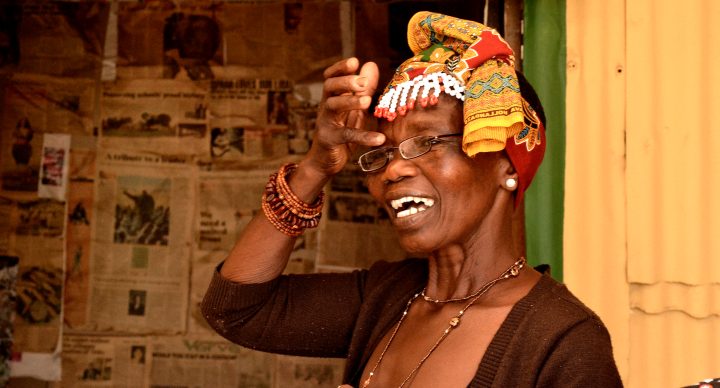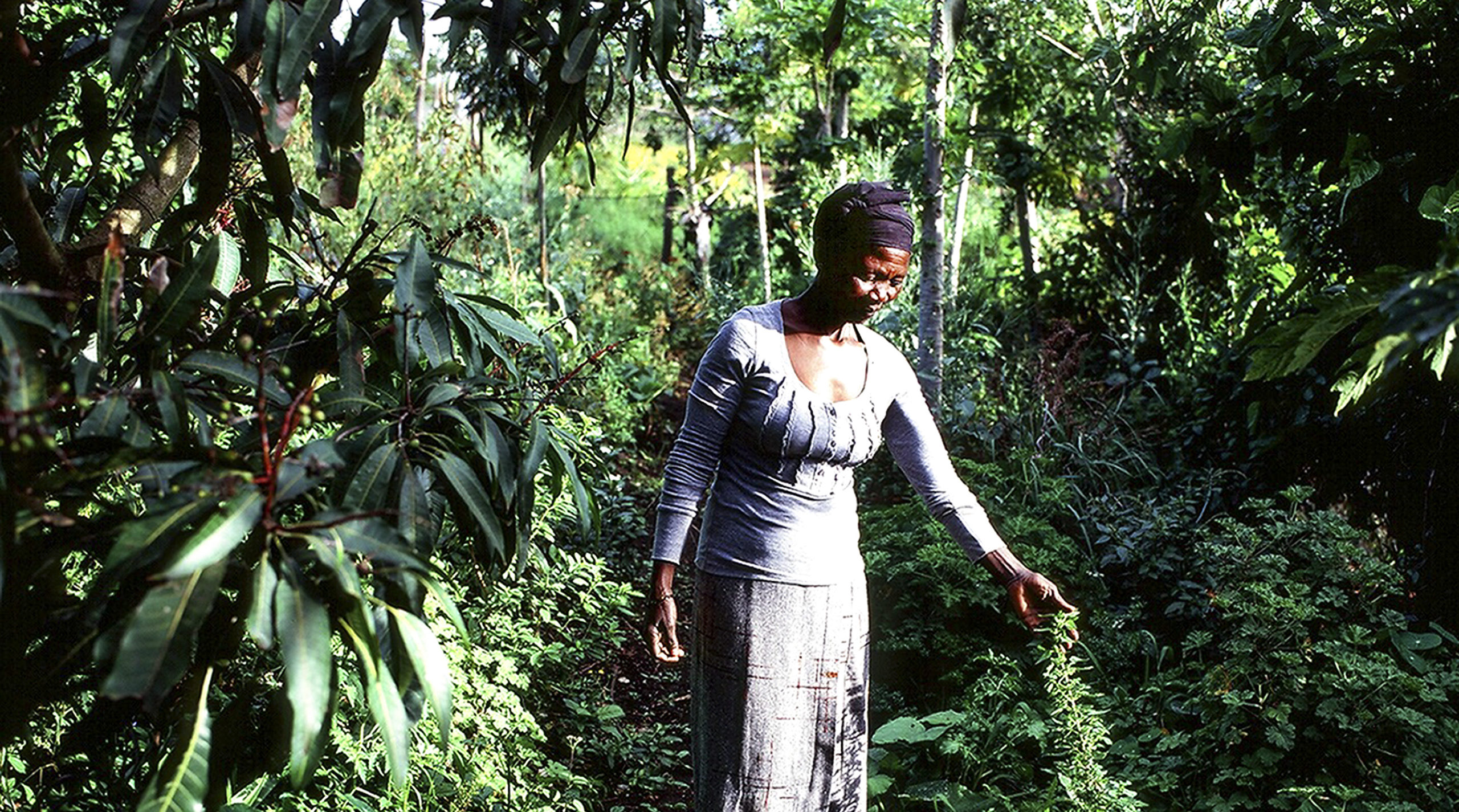MAVERICK CITIZEN TRIBUTE
Gogo Qho: A visionary farmer and conservationist who refused to be a prisoner of history

On the edge of a dusty hillside in a neglected former Bantustan, hemmed in by corporate agriculture and the detritus of our past, Gogo Qho led a revolution without uttering slogans and carrying placards. She transformed us without seeking to be a transformative agent.
The final day of the sour year of 2020 dealt us another severe blow. Gogo Fakazile Mthethwa, affectionately known as Gogo Qho, of Mtubatuba in northern KwaZulu-Natal, passed away after being diagnosed with cancer a few days before.
The theme song of Aaron McGruder’s animated series The Boondocks succinctly captures the life and times of Gogo Qho. Reworking Psalm 118, McGruder says:
I am the stone that the builder refused
I am the visual, the inspiration
That made Lady sing the blues
I’m the spark that makes your idea bright
The same spark that lights the dark
So that you can know your left from your right.
Gogo Qho was happy to share her encyclopedic knowledge of traditional and indigenous plants. She was often called upon by academics to participate in research projects or to lecture students, though she had no formal academic training and many people in her surrounding community called her crazy and old fashioned for preferring to grow her own food and medicine.
We first met Gogo Qho fortuitously in 2012 when we were working on a study of indigenous vegetables funded by the National Research Foundation. After travelling many hours on the road around Mtubatuba we came across a little handmade, handwritten cardboard sign, brazenly nailed to a lamppost next to a giant KFC billboard, announcing “permaculture, Gogo Qho, 072… ”
Since then, Gogo has been a permanent presence in our lives, becoming a friend, teacher and mother in the “kin-making” sense so beautifully advocated by Donna Haraway.
When we first met her the indigenous vegetables, herbs and trees that Gogo Qho grew on a modest slope outside Mtubatuba stood out for their sheer variety. We marvelled at the dizzying number of forgotten plants such as uxhaphosi, unsukumbili, umsuzwane, idlebelendlovu, iboza, umdumbula and umhlonyane growing among cabbage and spinach.
Her lush garden, we learnt over time, was not simply a home to forgotten plants. It was a testament to hard work and an unrelenting struggle to make manifest a prophetic vision for a reparative future. It also manifested her worldview in which every living thing had a place – she tended and befriended the weeds, insects, birds and other creatures in the garden, those seen as beneficial as well as those deemed pests or threats.

Gogo Qho in her garden. (Photo: Jarek Plouhar)
Gogo was not always a farmer. Born on the margins of the KwaZulu Bantustan in the 1950s, and unable to resist the pull of the “fancy fancy life” of the city, she migrated to Durban in the 1970s and 1980s, eking out a living in a variety of dead-end jobs that her upbringing under apartheid had prepared her for.
To free herself from this type of work she experimented with a creche, but her true transformation came after a car accident left her severely injured. Refusing to accept the diagnosis that her injuries were permanent, she turned to the soil to heal herself. Using ancestral knowledge and educating herself with whatever tools and resources were available, Gogo Qho gradually became a permaculturalist, a herbal specialist and, most remarkably, a walking library of indigenous plants, nutrition and health.
In Gogo’s transformation into a farmer, the rejected stone became the cornerstone.
Like the imbuya that grows almost anywhere, Gogo Qho resolutely defied our social system that has rendered people like her a burden. Despite the designs of the colonial, apartheid and post-apartheid states to uproot people like her, she worked hard to create an alternative future. She muttered little complaints but worked the soil, grounded, and grounding us in our relationships with each other, with nature.
Her cultivation was shaped by the desire to be free of the agro-industrial food system – to grow what she ate and eat what she grew. Constantly drawing our attention to the food system’s effect on our bodies and social relations, she urged us to do the same. “How can you claim to be free if you are not in control of what is on your plate?” she once asked.
Although she had never read them, her work and her teachings embodied the insights of philosopher Frantz Fanon and former Burkina Faso president Thomas Sankara on the question of land and bread. She reminds us of the connection that Sankara makes between imperialism and hunger: “It is natural that he who feeds you also imposes his will… We are free. He who does not feed you can demand nothing of you.”
If for many of us the great catastrophe exists in the past (colonialism, apartheid, etc), Gogo’s genius was encouraging us to see catastrophe as always there, always coming: “What will you do in 50 years when you will have no seeds? What will you eat?”

Gogo Qho was happy to share her encyclopedic knowledge of traditional and indigenous plants. (Photo: Jarek Plouhar)
Gogo’s life and work challenge us to continue to ask: Who and what counts in the world? Why do particular kinds of knowledge count and others not? There on the edges of a dusty hillside in a neglected former Bantustan, hemmed in by corporate agriculture and the detritus of our past, she was leading a revolution without the trappings of a revolutionary who utters slogans and carries placards. She transformed us without seeking to be a transformative agent. She refused to be a prisoner of history.
Given the state of land ownership in South Africa, it is not surprising that her health started deteriorating in 2019 when she lost her acre. Like many small-scale farmers her tenure was precarious as the land belonged to a relative. When recounting her loss of land she wept that she was not even allowed to save her beloved seeds. With that single act of dispossession a large portion of her historical seed bank was lost, further eroding access to indigenous food and medicinal plants for future generations.
The feminist journal Agenda profiled her in 2016. Her final words quoted in that article are now appropriate: “Ngiyimbewu eyalahlwa ezaleni lamazala. Kodwa ngiyodlondlobala ngime ngithi mpo (I am the seed that was cast out in the rubbish heap of rubbish heaps. But I will emerge tall and erect).”
It is this indefatigable and indomitable spirit that defined Gogo Qho. Although we will miss her, she lives on in our minds and hearts, in our fields through her seeds, and in our computers through her words and vision. We marvel at the life of creativity, imagination and courage she lived. She was, and is, “a spark that lights the dark”, a force guiding us along pathways that otherwise might have remained unnoticed.
We are convinced she has seeded us with her imagination and creativity, and that part of our task lies in resurrecting more enlivening futures. In doing so we can keep what she tried to nourish alive and perhaps pass it on to others. In the meantime we can honour her spirit by doing our work diligently, attentively, playfully and joyfully while navigating the many boulders in the way.
We are comforted that we knew her. We are delighted that, like the hyphae in mycorrhiza, she drew from her ancestral soils to nourish our growth as human beings, farmers and academics. She will continue to live in our endeavours through the seeds and teachings she shared so freely.
She passed through Johannesburg in 2020 and brought a huge selection of seeds to be shared and planted, since she didn’t have room to grow them on her reduced plot. When we last visited her in Mtubatuba shortly before her passing she gave us a sheaf of uphoko and a seedling of umhlonyane bush. While we mourn this irreversible loss we celebrate what she did on this planet to foster abundance, and know she has departed only to reconstitute refugia elsewhere.
Gogo Qho is survived by her daughter Gugu, grandchildren Sesi, Khosi and Ne, great-grandchild Sthelo and a throng of friends, farmers and fellow travellers who celebrate her life.
Lala ngokuthula, ntomb’ endala! Nyambose! DM/MC
Mvuselelo Ngcoya is the co-founder of Bonakude Farm in Richmond and an associate professor in Development Studies at the University of KwaZulu-Natal. Narendran Kumarakulasingam is a Fellow at the Balsillie School of International Affairs, Canada, and Associate Editor of the Journal of Narrative Politics. Brittany Kesselman is a Research Associate at the Society, Work and Politics Institute at Wits University.



















 Become an Insider
Become an Insider
Comments - Please login in order to comment.